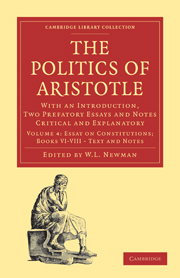Book contents
- Frontmatter
- Contents
- THE CONSTITUTIONS DEALT WITH BY ARISTOTLE IN THE POLITICS
- Errata
- TEXT OF BOOK VI (IV)
- TEXT OF BOOK VII (V)
- TEXT OF BOOK VIII (VI)
- CRITICAL NOTES
- NOTES TO BOOK VI (IV)
- PRELIMINARY REMARKS ON BOOK VII (V)
- NOTES TO BOOK VIII (VI)
- APPENDIX
- ADDITIONS AND CORRECTIONS TO VOL. IV
- GENERAL INDEX
- INDEX OF GREEK WORDS NOTICED IN THE WORK
- GRAMMATICAL INDEX
- SYMBOLS AND ABBREVIATIONS
THE CONSTITUTIONS DEALT WITH BY ARISTOTLE IN THE POLITICS
Published online by Cambridge University Press: 07 September 2011
- Frontmatter
- Contents
- THE CONSTITUTIONS DEALT WITH BY ARISTOTLE IN THE POLITICS
- Errata
- TEXT OF BOOK VI (IV)
- TEXT OF BOOK VII (V)
- TEXT OF BOOK VIII (VI)
- CRITICAL NOTES
- NOTES TO BOOK VI (IV)
- PRELIMINARY REMARKS ON BOOK VII (V)
- NOTES TO BOOK VIII (VI)
- APPENDIX
- ADDITIONS AND CORRECTIONS TO VOL. IV
- GENERAL INDEX
- INDEX OF GREEK WORDS NOTICED IN THE WORK
- GRAMMATICAL INDEX
- SYMBOLS AND ABBREVIATIONS
Summary
We must not expect to find in the last three Books of the Politics a systematic description of the various forms of constitution dealt with in them and a complete estimate of their strength and weakness, their merits and defects. The object of these Books is rather a practical object, to teach statesmen how to frame, amend, and administer each constitution so that it may last. Aristotle is naturally led in the course of his inquiries on this subject to mark off the various forms and sub-forms of constitution from each other, and incidentally to throw much light on their nature and tendencies, but his paramount object is a practical object, to give guidance to statesmen, not to set before us a detailed picture of each constitution and its working. We gather from what he tells us that statesmen were not aware how many sub-forms of each constitution existed, and that consequently they committed errors both in introducing and in amending constitutions. They probably confounded the sub-forms, and gave one of them institutions appropriate to another. We gather also that they often introduced constitutions and sub-forms of constitution where they were out of place; that they often sought rather to make the constitutions they framed pronounced examples of their type than to make them durable; and that they commonly did not attempt to create by education and habituation an êthos favourable to the maintenance of the constitution. Aristotle seeks to enable statesmen to avoid all these errors. His object is to make the study of constitutions more thorough and detailed and more practically useful than it had been.
- Type
- Chapter
- Information
- Politics of AristotleWith an Introduction, Two Prefatory Essays and Notes Critical and Explanatory, pp. vii - lxxPublisher: Cambridge University PressPrint publication year: 2010First published in: 1902

